Unveiling Trauma: An Analysis of Imagery in Sylvia Plath's Poems
VerifiedAdded on 2023/06/08
|18
|7649
|266
Essay
AI Summary
This essay provides a comprehensive analysis of the use of imagery in Sylvia Plath's poetry, focusing on how she portrays trauma, domestic abuse, and the after-effects of war. The essay examines key poems such as "Daddy," "Lady Lazarus," and "The Jailer," highlighting Plath's confessional style and her exploration of complex themes related to her personal experiences and the historical context of the Cold War and the aftermath of World War II. The analysis delves into the symbolism, metaphors, and poetic devices employed by Plath to convey the psychological and emotional impact of trauma, including the impact of her emotionally unavailable father, and the horrors of the Holocaust. The essay also explores the intersection of personal suffering and public history, demonstrating how Plath's poetry serves as a form of protest against violence and the erosion of human values. Furthermore, it discusses the ways in which Plath's work challenges traditional gender roles and offers a unique perspective on the female experience in a patriarchal society. The essay concludes by emphasizing the enduring relevance of Plath's work and its significance as a testament to the power of poetry to confront and process trauma.
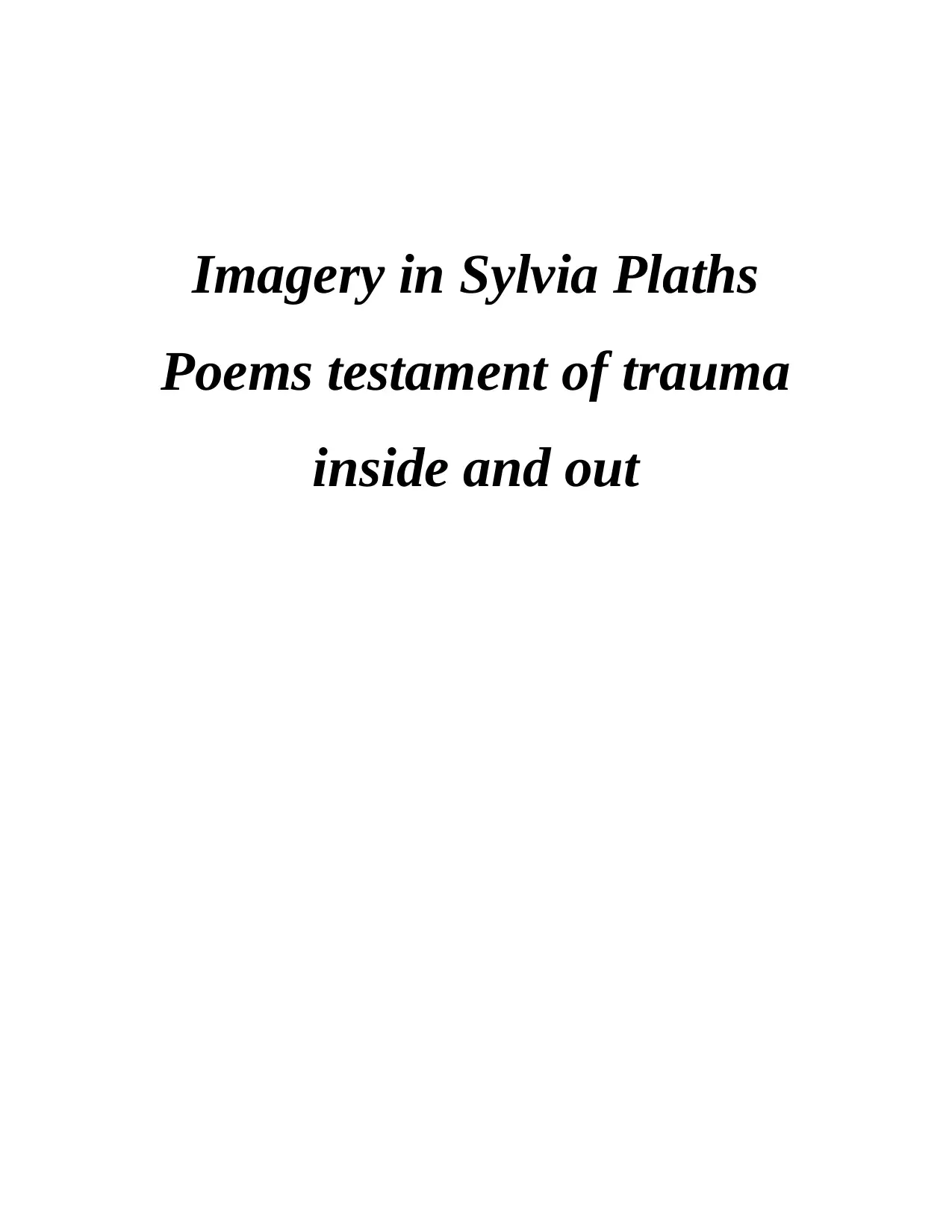
Imagery in Sylvia Plaths
Poems testament of trauma
inside and out
Poems testament of trauma
inside and out
Paraphrase This Document
Need a fresh take? Get an instant paraphrase of this document with our AI Paraphraser
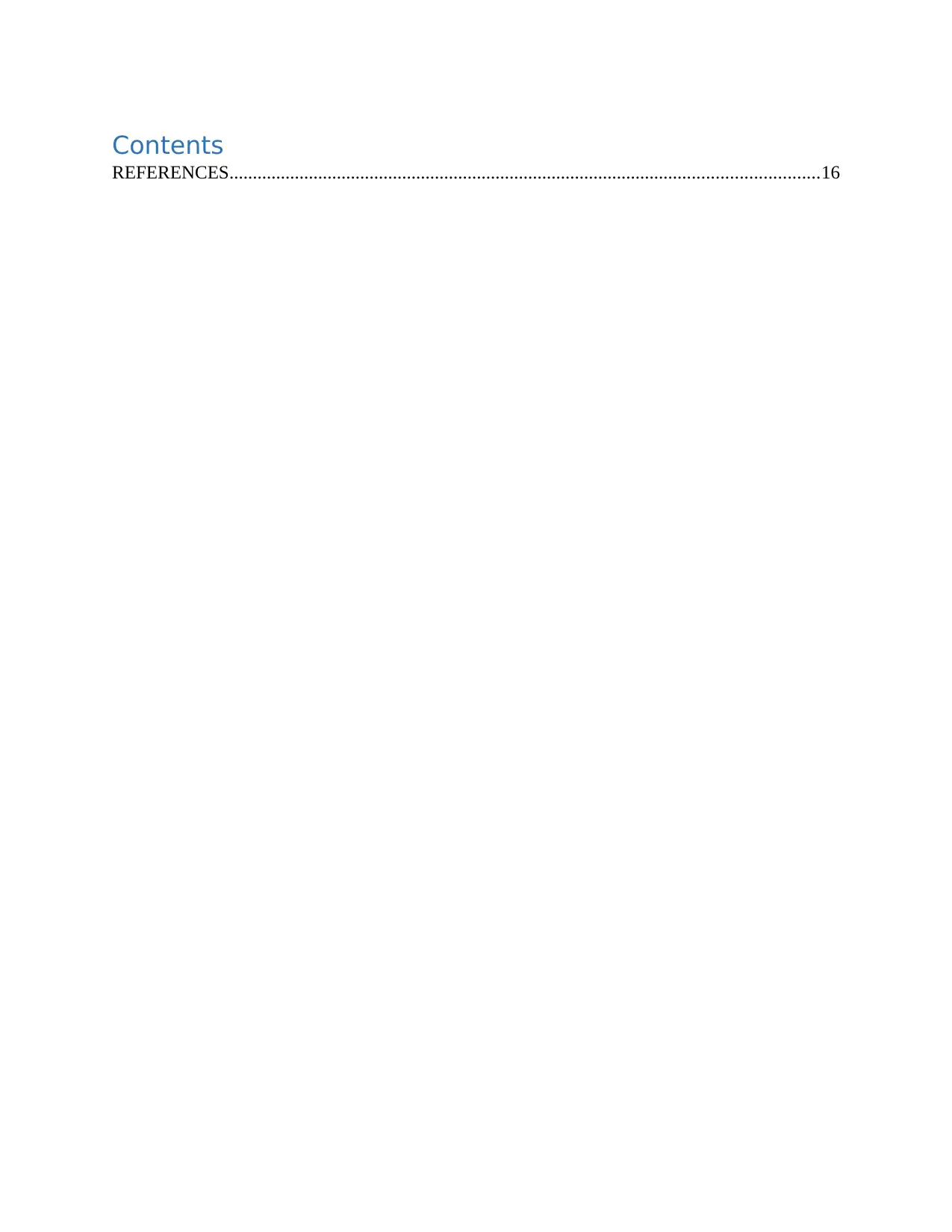
Contents
REFERENCES..............................................................................................................................16
REFERENCES..............................................................................................................................16
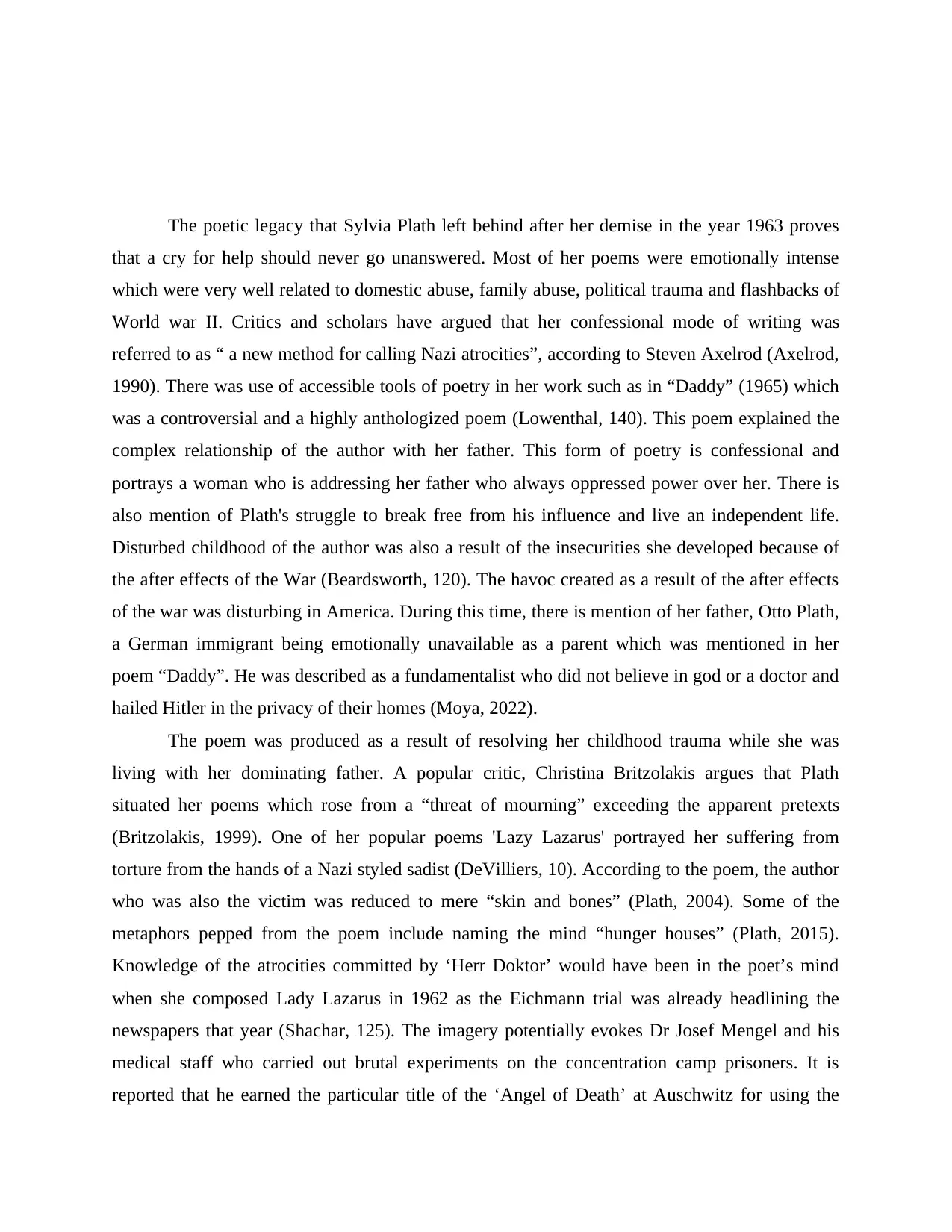
The poetic legacy that Sylvia Plath left behind after her demise in the year 1963 proves
that a cry for help should never go unanswered. Most of her poems were emotionally intense
which were very well related to domestic abuse, family abuse, political trauma and flashbacks of
World war II. Critics and scholars have argued that her confessional mode of writing was
referred to as “ a new method for calling Nazi atrocities”, according to Steven Axelrod (Axelrod,
1990). There was use of accessible tools of poetry in her work such as in “Daddy” (1965) which
was a controversial and a highly anthologized poem (Lowenthal, 140). This poem explained the
complex relationship of the author with her father. This form of poetry is confessional and
portrays a woman who is addressing her father who always oppressed power over her. There is
also mention of Plath's struggle to break free from his influence and live an independent life.
Disturbed childhood of the author was also a result of the insecurities she developed because of
the after effects of the War (Beardsworth, 120). The havoc created as a result of the after effects
of the war was disturbing in America. During this time, there is mention of her father, Otto Plath,
a German immigrant being emotionally unavailable as a parent which was mentioned in her
poem “Daddy”. He was described as a fundamentalist who did not believe in god or a doctor and
hailed Hitler in the privacy of their homes (Moya, 2022).
The poem was produced as a result of resolving her childhood trauma while she was
living with her dominating father. A popular critic, Christina Britzolakis argues that Plath
situated her poems which rose from a “threat of mourning” exceeding the apparent pretexts
(Britzolakis, 1999). One of her popular poems 'Lazy Lazarus' portrayed her suffering from
torture from the hands of a Nazi styled sadist (DeVilliers, 10). According to the poem, the author
who was also the victim was reduced to mere “skin and bones” (Plath, 2004). Some of the
metaphors pepped from the poem include naming the mind “hunger houses” (Plath, 2015).
Knowledge of the atrocities committed by ‘Herr Doktor’ would have been in the poet’s mind
when she composed Lady Lazarus in 1962 as the Eichmann trial was already headlining the
newspapers that year (Shachar, 125). The imagery potentially evokes Dr Josef Mengel and his
medical staff who carried out brutal experiments on the concentration camp prisoners. It is
reported that he earned the particular title of the ‘Angel of Death’ at Auschwitz for using the
that a cry for help should never go unanswered. Most of her poems were emotionally intense
which were very well related to domestic abuse, family abuse, political trauma and flashbacks of
World war II. Critics and scholars have argued that her confessional mode of writing was
referred to as “ a new method for calling Nazi atrocities”, according to Steven Axelrod (Axelrod,
1990). There was use of accessible tools of poetry in her work such as in “Daddy” (1965) which
was a controversial and a highly anthologized poem (Lowenthal, 140). This poem explained the
complex relationship of the author with her father. This form of poetry is confessional and
portrays a woman who is addressing her father who always oppressed power over her. There is
also mention of Plath's struggle to break free from his influence and live an independent life.
Disturbed childhood of the author was also a result of the insecurities she developed because of
the after effects of the War (Beardsworth, 120). The havoc created as a result of the after effects
of the war was disturbing in America. During this time, there is mention of her father, Otto Plath,
a German immigrant being emotionally unavailable as a parent which was mentioned in her
poem “Daddy”. He was described as a fundamentalist who did not believe in god or a doctor and
hailed Hitler in the privacy of their homes (Moya, 2022).
The poem was produced as a result of resolving her childhood trauma while she was
living with her dominating father. A popular critic, Christina Britzolakis argues that Plath
situated her poems which rose from a “threat of mourning” exceeding the apparent pretexts
(Britzolakis, 1999). One of her popular poems 'Lazy Lazarus' portrayed her suffering from
torture from the hands of a Nazi styled sadist (DeVilliers, 10). According to the poem, the author
who was also the victim was reduced to mere “skin and bones” (Plath, 2004). Some of the
metaphors pepped from the poem include naming the mind “hunger houses” (Plath, 2015).
Knowledge of the atrocities committed by ‘Herr Doktor’ would have been in the poet’s mind
when she composed Lady Lazarus in 1962 as the Eichmann trial was already headlining the
newspapers that year (Shachar, 125). The imagery potentially evokes Dr Josef Mengel and his
medical staff who carried out brutal experiments on the concentration camp prisoners. It is
reported that he earned the particular title of the ‘Angel of Death’ at Auschwitz for using the
⊘ This is a preview!⊘
Do you want full access?
Subscribe today to unlock all pages.

Trusted by 1+ million students worldwide
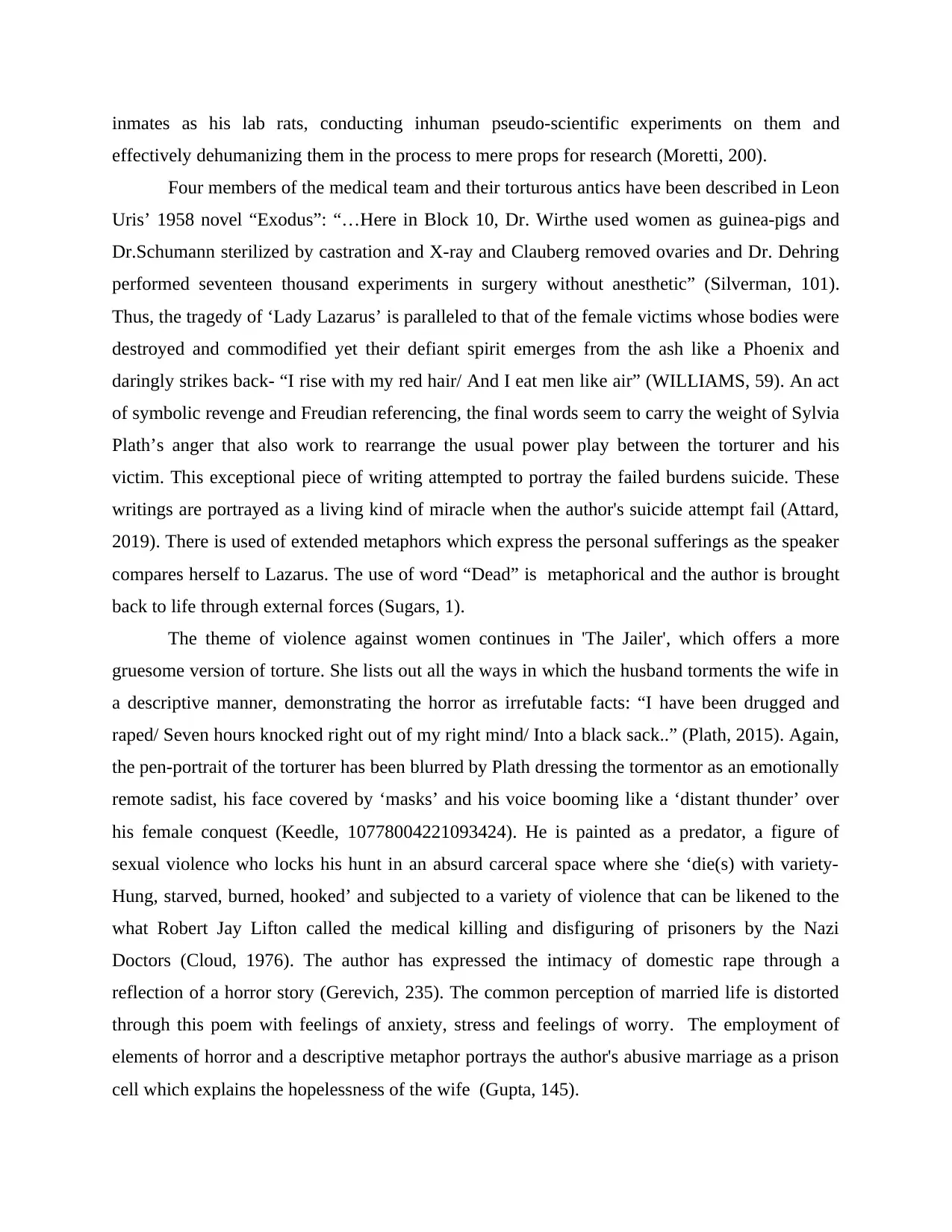
inmates as his lab rats, conducting inhuman pseudo-scientific experiments on them and
effectively dehumanizing them in the process to mere props for research (Moretti, 200).
Four members of the medical team and their torturous antics have been described in Leon
Uris’ 1958 novel “Exodus”: “…Here in Block 10, Dr. Wirthe used women as guinea-pigs and
Dr.Schumann sterilized by castration and X-ray and Clauberg removed ovaries and Dr. Dehring
performed seventeen thousand experiments in surgery without anesthetic” (Silverman, 101).
Thus, the tragedy of ‘Lady Lazarus’ is paralleled to that of the female victims whose bodies were
destroyed and commodified yet their defiant spirit emerges from the ash like a Phoenix and
daringly strikes back- “I rise with my red hair/ And I eat men like air” (WILLIAMS, 59). An act
of symbolic revenge and Freudian referencing, the final words seem to carry the weight of Sylvia
Plath’s anger that also work to rearrange the usual power play between the torturer and his
victim. This exceptional piece of writing attempted to portray the failed burdens suicide. These
writings are portrayed as a living kind of miracle when the author's suicide attempt fail (Attard,
2019). There is used of extended metaphors which express the personal sufferings as the speaker
compares herself to Lazarus. The use of word “Dead” is metaphorical and the author is brought
back to life through external forces (Sugars, 1).
The theme of violence against women continues in 'The Jailer', which offers a more
gruesome version of torture. She lists out all the ways in which the husband torments the wife in
a descriptive manner, demonstrating the horror as irrefutable facts: “I have been drugged and
raped/ Seven hours knocked right out of my right mind/ Into a black sack..” (Plath, 2015). Again,
the pen-portrait of the torturer has been blurred by Plath dressing the tormentor as an emotionally
remote sadist, his face covered by ‘masks’ and his voice booming like a ‘distant thunder’ over
his female conquest (Keedle, 10778004221093424). He is painted as a predator, a figure of
sexual violence who locks his hunt in an absurd carceral space where she ‘die(s) with variety-
Hung, starved, burned, hooked’ and subjected to a variety of violence that can be likened to the
what Robert Jay Lifton called the medical killing and disfiguring of prisoners by the Nazi
Doctors (Cloud, 1976). The author has expressed the intimacy of domestic rape through a
reflection of a horror story (Gerevich, 235). The common perception of married life is distorted
through this poem with feelings of anxiety, stress and feelings of worry. The employment of
elements of horror and a descriptive metaphor portrays the author's abusive marriage as a prison
cell which explains the hopelessness of the wife (Gupta, 145).
effectively dehumanizing them in the process to mere props for research (Moretti, 200).
Four members of the medical team and their torturous antics have been described in Leon
Uris’ 1958 novel “Exodus”: “…Here in Block 10, Dr. Wirthe used women as guinea-pigs and
Dr.Schumann sterilized by castration and X-ray and Clauberg removed ovaries and Dr. Dehring
performed seventeen thousand experiments in surgery without anesthetic” (Silverman, 101).
Thus, the tragedy of ‘Lady Lazarus’ is paralleled to that of the female victims whose bodies were
destroyed and commodified yet their defiant spirit emerges from the ash like a Phoenix and
daringly strikes back- “I rise with my red hair/ And I eat men like air” (WILLIAMS, 59). An act
of symbolic revenge and Freudian referencing, the final words seem to carry the weight of Sylvia
Plath’s anger that also work to rearrange the usual power play between the torturer and his
victim. This exceptional piece of writing attempted to portray the failed burdens suicide. These
writings are portrayed as a living kind of miracle when the author's suicide attempt fail (Attard,
2019). There is used of extended metaphors which express the personal sufferings as the speaker
compares herself to Lazarus. The use of word “Dead” is metaphorical and the author is brought
back to life through external forces (Sugars, 1).
The theme of violence against women continues in 'The Jailer', which offers a more
gruesome version of torture. She lists out all the ways in which the husband torments the wife in
a descriptive manner, demonstrating the horror as irrefutable facts: “I have been drugged and
raped/ Seven hours knocked right out of my right mind/ Into a black sack..” (Plath, 2015). Again,
the pen-portrait of the torturer has been blurred by Plath dressing the tormentor as an emotionally
remote sadist, his face covered by ‘masks’ and his voice booming like a ‘distant thunder’ over
his female conquest (Keedle, 10778004221093424). He is painted as a predator, a figure of
sexual violence who locks his hunt in an absurd carceral space where she ‘die(s) with variety-
Hung, starved, burned, hooked’ and subjected to a variety of violence that can be likened to the
what Robert Jay Lifton called the medical killing and disfiguring of prisoners by the Nazi
Doctors (Cloud, 1976). The author has expressed the intimacy of domestic rape through a
reflection of a horror story (Gerevich, 235). The common perception of married life is distorted
through this poem with feelings of anxiety, stress and feelings of worry. The employment of
elements of horror and a descriptive metaphor portrays the author's abusive marriage as a prison
cell which explains the hopelessness of the wife (Gupta, 145).
Paraphrase This Document
Need a fresh take? Get an instant paraphrase of this document with our AI Paraphraser
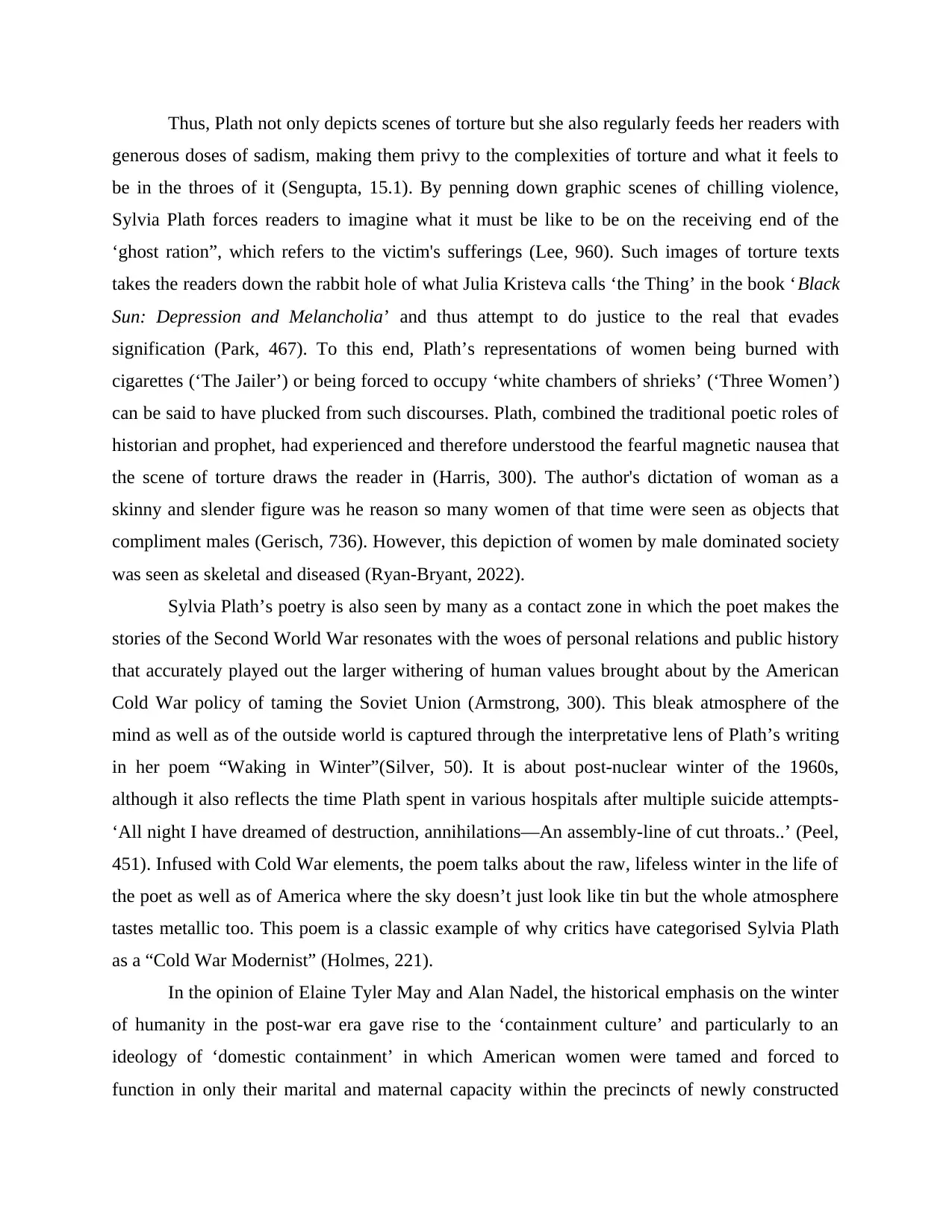
Thus, Plath not only depicts scenes of torture but she also regularly feeds her readers with
generous doses of sadism, making them privy to the complexities of torture and what it feels to
be in the throes of it (Sengupta, 15.1). By penning down graphic scenes of chilling violence,
Sylvia Plath forces readers to imagine what it must be like to be on the receiving end of the
‘ghost ration”, which refers to the victim's sufferings (Lee, 960). Such images of torture texts
takes the readers down the rabbit hole of what Julia Kristeva calls ‘the Thing’ in the book ‘Black
Sun: Depression and Melancholia’ and thus attempt to do justice to the real that evades
signification (Park, 467). To this end, Plath’s representations of women being burned with
cigarettes (‘The Jailer’) or being forced to occupy ‘white chambers of shrieks’ (‘Three Women’)
can be said to have plucked from such discourses. Plath, combined the traditional poetic roles of
historian and prophet, had experienced and therefore understood the fearful magnetic nausea that
the scene of torture draws the reader in (Harris, 300). The author's dictation of woman as a
skinny and slender figure was he reason so many women of that time were seen as objects that
compliment males (Gerisch, 736). However, this depiction of women by male dominated society
was seen as skeletal and diseased (Ryan-Bryant, 2022).
Sylvia Plath’s poetry is also seen by many as a contact zone in which the poet makes the
stories of the Second World War resonates with the woes of personal relations and public history
that accurately played out the larger withering of human values brought about by the American
Cold War policy of taming the Soviet Union (Armstrong, 300). This bleak atmosphere of the
mind as well as of the outside world is captured through the interpretative lens of Plath’s writing
in her poem “Waking in Winter”(Silver, 50). It is about post-nuclear winter of the 1960s,
although it also reflects the time Plath spent in various hospitals after multiple suicide attempts-
‘All night I have dreamed of destruction, annihilations—An assembly-line of cut throats..’ (Peel,
451). Infused with Cold War elements, the poem talks about the raw, lifeless winter in the life of
the poet as well as of America where the sky doesn’t just look like tin but the whole atmosphere
tastes metallic too. This poem is a classic example of why critics have categorised Sylvia Plath
as a “Cold War Modernist” (Holmes, 221).
In the opinion of Elaine Tyler May and Alan Nadel, the historical emphasis on the winter
of humanity in the post-war era gave rise to the ‘containment culture’ and particularly to an
ideology of ‘domestic containment’ in which American women were tamed and forced to
function in only their marital and maternal capacity within the precincts of newly constructed
generous doses of sadism, making them privy to the complexities of torture and what it feels to
be in the throes of it (Sengupta, 15.1). By penning down graphic scenes of chilling violence,
Sylvia Plath forces readers to imagine what it must be like to be on the receiving end of the
‘ghost ration”, which refers to the victim's sufferings (Lee, 960). Such images of torture texts
takes the readers down the rabbit hole of what Julia Kristeva calls ‘the Thing’ in the book ‘Black
Sun: Depression and Melancholia’ and thus attempt to do justice to the real that evades
signification (Park, 467). To this end, Plath’s representations of women being burned with
cigarettes (‘The Jailer’) or being forced to occupy ‘white chambers of shrieks’ (‘Three Women’)
can be said to have plucked from such discourses. Plath, combined the traditional poetic roles of
historian and prophet, had experienced and therefore understood the fearful magnetic nausea that
the scene of torture draws the reader in (Harris, 300). The author's dictation of woman as a
skinny and slender figure was he reason so many women of that time were seen as objects that
compliment males (Gerisch, 736). However, this depiction of women by male dominated society
was seen as skeletal and diseased (Ryan-Bryant, 2022).
Sylvia Plath’s poetry is also seen by many as a contact zone in which the poet makes the
stories of the Second World War resonates with the woes of personal relations and public history
that accurately played out the larger withering of human values brought about by the American
Cold War policy of taming the Soviet Union (Armstrong, 300). This bleak atmosphere of the
mind as well as of the outside world is captured through the interpretative lens of Plath’s writing
in her poem “Waking in Winter”(Silver, 50). It is about post-nuclear winter of the 1960s,
although it also reflects the time Plath spent in various hospitals after multiple suicide attempts-
‘All night I have dreamed of destruction, annihilations—An assembly-line of cut throats..’ (Peel,
451). Infused with Cold War elements, the poem talks about the raw, lifeless winter in the life of
the poet as well as of America where the sky doesn’t just look like tin but the whole atmosphere
tastes metallic too. This poem is a classic example of why critics have categorised Sylvia Plath
as a “Cold War Modernist” (Holmes, 221).
In the opinion of Elaine Tyler May and Alan Nadel, the historical emphasis on the winter
of humanity in the post-war era gave rise to the ‘containment culture’ and particularly to an
ideology of ‘domestic containment’ in which American women were tamed and forced to
function in only their marital and maternal capacity within the precincts of newly constructed
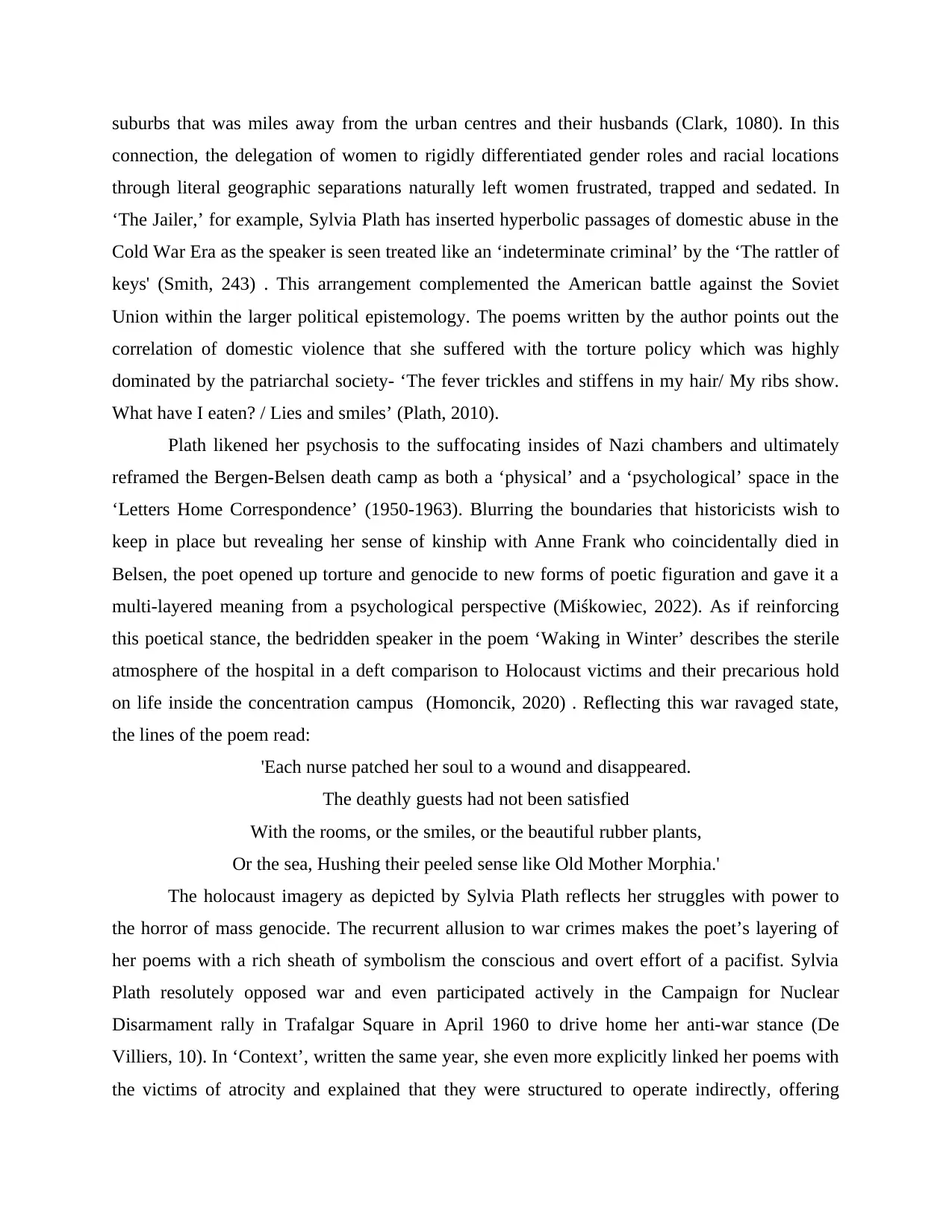
suburbs that was miles away from the urban centres and their husbands (Clark, 1080). In this
connection, the delegation of women to rigidly differentiated gender roles and racial locations
through literal geographic separations naturally left women frustrated, trapped and sedated. In
‘The Jailer,’ for example, Sylvia Plath has inserted hyperbolic passages of domestic abuse in the
Cold War Era as the speaker is seen treated like an ‘indeterminate criminal’ by the ‘The rattler of
keys' (Smith, 243) . This arrangement complemented the American battle against the Soviet
Union within the larger political epistemology. The poems written by the author points out the
correlation of domestic violence that she suffered with the torture policy which was highly
dominated by the patriarchal society- ‘The fever trickles and stiffens in my hair/ My ribs show.
What have I eaten? / Lies and smiles’ (Plath, 2010).
Plath likened her psychosis to the suffocating insides of Nazi chambers and ultimately
reframed the Bergen-Belsen death camp as both a ‘physical’ and a ‘psychological’ space in the
‘Letters Home Correspondence’ (1950-1963). Blurring the boundaries that historicists wish to
keep in place but revealing her sense of kinship with Anne Frank who coincidentally died in
Belsen, the poet opened up torture and genocide to new forms of poetic figuration and gave it a
multi-layered meaning from a psychological perspective (Miśkowiec, 2022). As if reinforcing
this poetical stance, the bedridden speaker in the poem ‘Waking in Winter’ describes the sterile
atmosphere of the hospital in a deft comparison to Holocaust victims and their precarious hold
on life inside the concentration campus (Homoncik, 2020) . Reflecting this war ravaged state,
the lines of the poem read:
'Each nurse patched her soul to a wound and disappeared.
The deathly guests had not been satisfied
With the rooms, or the smiles, or the beautiful rubber plants,
Or the sea, Hushing their peeled sense like Old Mother Morphia.'
The holocaust imagery as depicted by Sylvia Plath reflects her struggles with power to
the horror of mass genocide. The recurrent allusion to war crimes makes the poet’s layering of
her poems with a rich sheath of symbolism the conscious and overt effort of a pacifist. Sylvia
Plath resolutely opposed war and even participated actively in the Campaign for Nuclear
Disarmament rally in Trafalgar Square in April 1960 to drive home her anti-war stance (De
Villiers, 10). In ‘Context’, written the same year, she even more explicitly linked her poems with
the victims of atrocity and explained that they were structured to operate indirectly, offering
connection, the delegation of women to rigidly differentiated gender roles and racial locations
through literal geographic separations naturally left women frustrated, trapped and sedated. In
‘The Jailer,’ for example, Sylvia Plath has inserted hyperbolic passages of domestic abuse in the
Cold War Era as the speaker is seen treated like an ‘indeterminate criminal’ by the ‘The rattler of
keys' (Smith, 243) . This arrangement complemented the American battle against the Soviet
Union within the larger political epistemology. The poems written by the author points out the
correlation of domestic violence that she suffered with the torture policy which was highly
dominated by the patriarchal society- ‘The fever trickles and stiffens in my hair/ My ribs show.
What have I eaten? / Lies and smiles’ (Plath, 2010).
Plath likened her psychosis to the suffocating insides of Nazi chambers and ultimately
reframed the Bergen-Belsen death camp as both a ‘physical’ and a ‘psychological’ space in the
‘Letters Home Correspondence’ (1950-1963). Blurring the boundaries that historicists wish to
keep in place but revealing her sense of kinship with Anne Frank who coincidentally died in
Belsen, the poet opened up torture and genocide to new forms of poetic figuration and gave it a
multi-layered meaning from a psychological perspective (Miśkowiec, 2022). As if reinforcing
this poetical stance, the bedridden speaker in the poem ‘Waking in Winter’ describes the sterile
atmosphere of the hospital in a deft comparison to Holocaust victims and their precarious hold
on life inside the concentration campus (Homoncik, 2020) . Reflecting this war ravaged state,
the lines of the poem read:
'Each nurse patched her soul to a wound and disappeared.
The deathly guests had not been satisfied
With the rooms, or the smiles, or the beautiful rubber plants,
Or the sea, Hushing their peeled sense like Old Mother Morphia.'
The holocaust imagery as depicted by Sylvia Plath reflects her struggles with power to
the horror of mass genocide. The recurrent allusion to war crimes makes the poet’s layering of
her poems with a rich sheath of symbolism the conscious and overt effort of a pacifist. Sylvia
Plath resolutely opposed war and even participated actively in the Campaign for Nuclear
Disarmament rally in Trafalgar Square in April 1960 to drive home her anti-war stance (De
Villiers, 10). In ‘Context’, written the same year, she even more explicitly linked her poems with
the victims of atrocity and explained that they were structured to operate indirectly, offering
⊘ This is a preview!⊘
Do you want full access?
Subscribe today to unlock all pages.

Trusted by 1+ million students worldwide
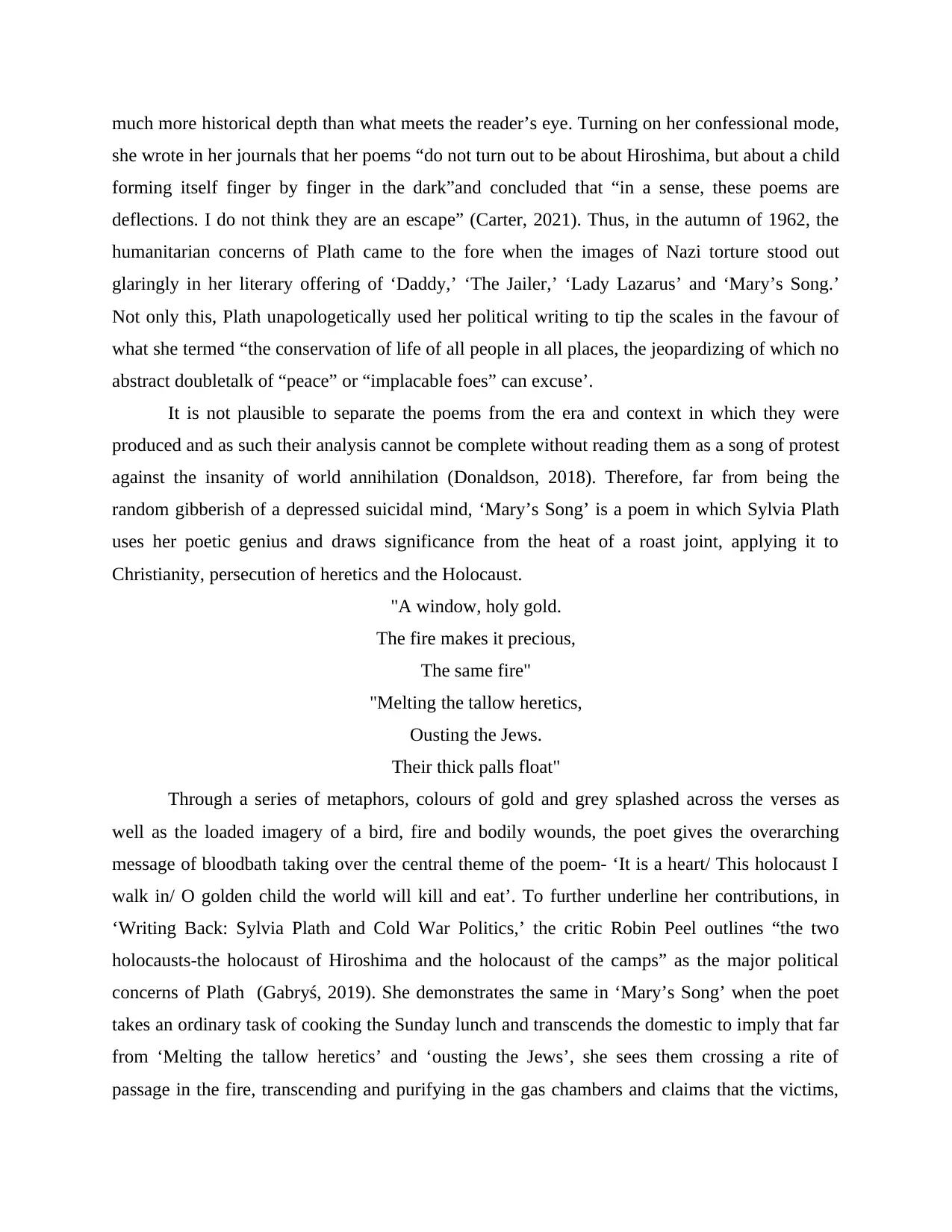
much more historical depth than what meets the reader’s eye. Turning on her confessional mode,
she wrote in her journals that her poems “do not turn out to be about Hiroshima, but about a child
forming itself finger by finger in the dark”and concluded that “in a sense, these poems are
deflections. I do not think they are an escape” (Carter, 2021). Thus, in the autumn of 1962, the
humanitarian concerns of Plath came to the fore when the images of Nazi torture stood out
glaringly in her literary offering of ‘Daddy,’ ‘The Jailer,’ ‘Lady Lazarus’ and ‘Mary’s Song.’
Not only this, Plath unapologetically used her political writing to tip the scales in the favour of
what she termed “the conservation of life of all people in all places, the jeopardizing of which no
abstract doubletalk of “peace” or “implacable foes” can excuse’.
It is not plausible to separate the poems from the era and context in which they were
produced and as such their analysis cannot be complete without reading them as a song of protest
against the insanity of world annihilation (Donaldson, 2018). Therefore, far from being the
random gibberish of a depressed suicidal mind, ‘Mary’s Song’ is a poem in which Sylvia Plath
uses her poetic genius and draws significance from the heat of a roast joint, applying it to
Christianity, persecution of heretics and the Holocaust.
"A window, holy gold.
The fire makes it precious,
The same fire"
"Melting the tallow heretics,
Ousting the Jews.
Their thick palls float"
Through a series of metaphors, colours of gold and grey splashed across the verses as
well as the loaded imagery of a bird, fire and bodily wounds, the poet gives the overarching
message of bloodbath taking over the central theme of the poem- ‘It is a heart/ This holocaust I
walk in/ O golden child the world will kill and eat’. To further underline her contributions, in
‘Writing Back: Sylvia Plath and Cold War Politics,’ the critic Robin Peel outlines “the two
holocausts-the holocaust of Hiroshima and the holocaust of the camps” as the major political
concerns of Plath (Gabryś, 2019). She demonstrates the same in ‘Mary’s Song’ when the poet
takes an ordinary task of cooking the Sunday lunch and transcends the domestic to imply that far
from ‘Melting the tallow heretics’ and ‘ousting the Jews’, she sees them crossing a rite of
passage in the fire, transcending and purifying in the gas chambers and claims that the victims,
she wrote in her journals that her poems “do not turn out to be about Hiroshima, but about a child
forming itself finger by finger in the dark”and concluded that “in a sense, these poems are
deflections. I do not think they are an escape” (Carter, 2021). Thus, in the autumn of 1962, the
humanitarian concerns of Plath came to the fore when the images of Nazi torture stood out
glaringly in her literary offering of ‘Daddy,’ ‘The Jailer,’ ‘Lady Lazarus’ and ‘Mary’s Song.’
Not only this, Plath unapologetically used her political writing to tip the scales in the favour of
what she termed “the conservation of life of all people in all places, the jeopardizing of which no
abstract doubletalk of “peace” or “implacable foes” can excuse’.
It is not plausible to separate the poems from the era and context in which they were
produced and as such their analysis cannot be complete without reading them as a song of protest
against the insanity of world annihilation (Donaldson, 2018). Therefore, far from being the
random gibberish of a depressed suicidal mind, ‘Mary’s Song’ is a poem in which Sylvia Plath
uses her poetic genius and draws significance from the heat of a roast joint, applying it to
Christianity, persecution of heretics and the Holocaust.
"A window, holy gold.
The fire makes it precious,
The same fire"
"Melting the tallow heretics,
Ousting the Jews.
Their thick palls float"
Through a series of metaphors, colours of gold and grey splashed across the verses as
well as the loaded imagery of a bird, fire and bodily wounds, the poet gives the overarching
message of bloodbath taking over the central theme of the poem- ‘It is a heart/ This holocaust I
walk in/ O golden child the world will kill and eat’. To further underline her contributions, in
‘Writing Back: Sylvia Plath and Cold War Politics,’ the critic Robin Peel outlines “the two
holocausts-the holocaust of Hiroshima and the holocaust of the camps” as the major political
concerns of Plath (Gabryś, 2019). She demonstrates the same in ‘Mary’s Song’ when the poet
takes an ordinary task of cooking the Sunday lunch and transcends the domestic to imply that far
from ‘Melting the tallow heretics’ and ‘ousting the Jews’, she sees them crossing a rite of
passage in the fire, transcending and purifying in the gas chambers and claims that the victims,
Paraphrase This Document
Need a fresh take? Get an instant paraphrase of this document with our AI Paraphraser
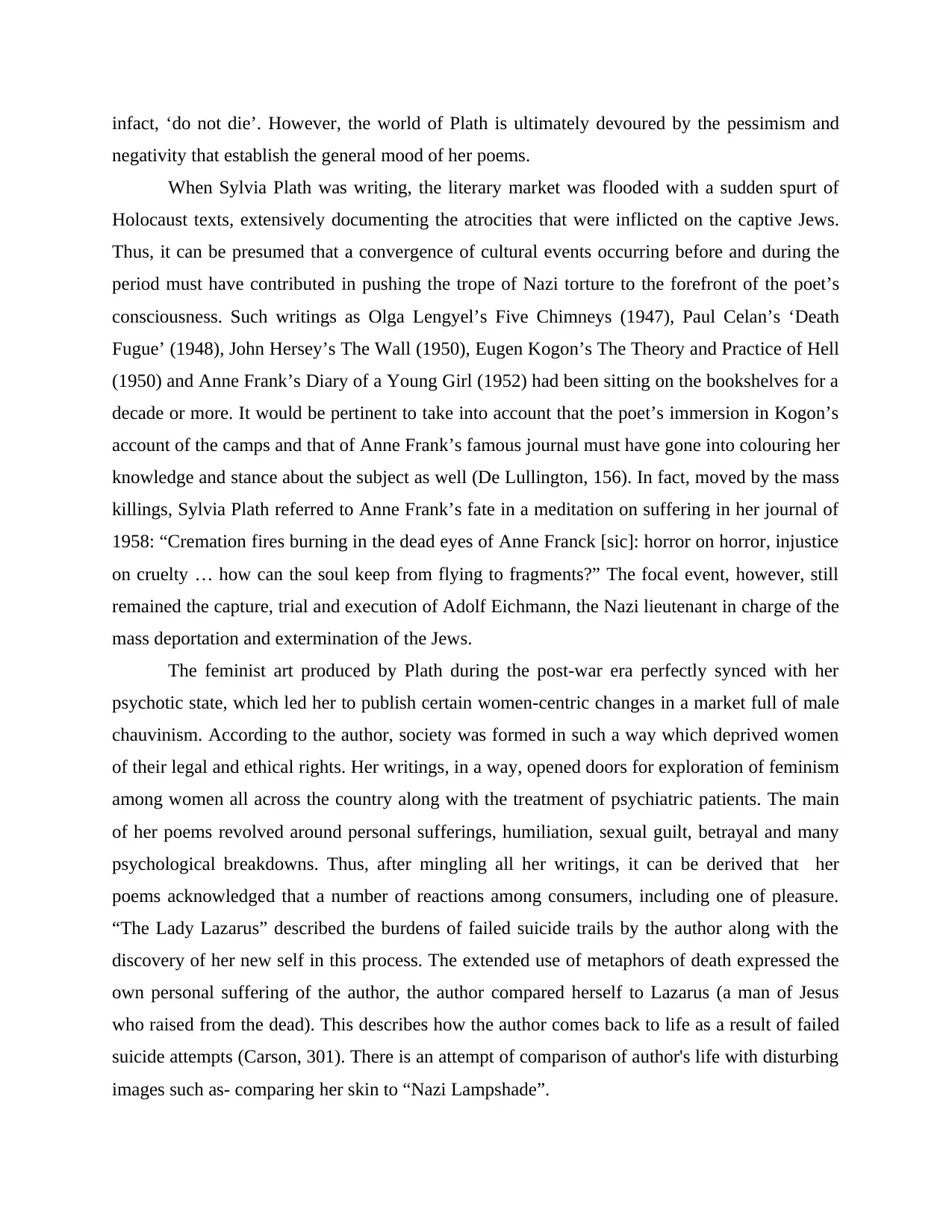
infact, ‘do not die’. However, the world of Plath is ultimately devoured by the pessimism and
negativity that establish the general mood of her poems.
When Sylvia Plath was writing, the literary market was flooded with a sudden spurt of
Holocaust texts, extensively documenting the atrocities that were inflicted on the captive Jews.
Thus, it can be presumed that a convergence of cultural events occurring before and during the
period must have contributed in pushing the trope of Nazi torture to the forefront of the poet’s
consciousness. Such writings as Olga Lengyel’s Five Chimneys (1947), Paul Celan’s ‘Death
Fugue’ (1948), John Hersey’s The Wall (1950), Eugen Kogon’s The Theory and Practice of Hell
(1950) and Anne Frank’s Diary of a Young Girl (1952) had been sitting on the bookshelves for a
decade or more. It would be pertinent to take into account that the poet’s immersion in Kogon’s
account of the camps and that of Anne Frank’s famous journal must have gone into colouring her
knowledge and stance about the subject as well (De Lullington, 156). In fact, moved by the mass
killings, Sylvia Plath referred to Anne Frank’s fate in a meditation on suffering in her journal of
1958: “Cremation fires burning in the dead eyes of Anne Franck [sic]: horror on horror, injustice
on cruelty … how can the soul keep from flying to fragments?” The focal event, however, still
remained the capture, trial and execution of Adolf Eichmann, the Nazi lieutenant in charge of the
mass deportation and extermination of the Jews.
The feminist art produced by Plath during the post-war era perfectly synced with her
psychotic state, which led her to publish certain women-centric changes in a market full of male
chauvinism. According to the author, society was formed in such a way which deprived women
of their legal and ethical rights. Her writings, in a way, opened doors for exploration of feminism
among women all across the country along with the treatment of psychiatric patients. The main
of her poems revolved around personal sufferings, humiliation, sexual guilt, betrayal and many
psychological breakdowns. Thus, after mingling all her writings, it can be derived that her
poems acknowledged that a number of reactions among consumers, including one of pleasure.
“The Lady Lazarus” described the burdens of failed suicide trails by the author along with the
discovery of her new self in this process. The extended use of metaphors of death expressed the
own personal suffering of the author, the author compared herself to Lazarus (a man of Jesus
who raised from the dead). This describes how the author comes back to life as a result of failed
suicide attempts (Carson, 301). There is an attempt of comparison of author's life with disturbing
images such as- comparing her skin to “Nazi Lampshade”.
negativity that establish the general mood of her poems.
When Sylvia Plath was writing, the literary market was flooded with a sudden spurt of
Holocaust texts, extensively documenting the atrocities that were inflicted on the captive Jews.
Thus, it can be presumed that a convergence of cultural events occurring before and during the
period must have contributed in pushing the trope of Nazi torture to the forefront of the poet’s
consciousness. Such writings as Olga Lengyel’s Five Chimneys (1947), Paul Celan’s ‘Death
Fugue’ (1948), John Hersey’s The Wall (1950), Eugen Kogon’s The Theory and Practice of Hell
(1950) and Anne Frank’s Diary of a Young Girl (1952) had been sitting on the bookshelves for a
decade or more. It would be pertinent to take into account that the poet’s immersion in Kogon’s
account of the camps and that of Anne Frank’s famous journal must have gone into colouring her
knowledge and stance about the subject as well (De Lullington, 156). In fact, moved by the mass
killings, Sylvia Plath referred to Anne Frank’s fate in a meditation on suffering in her journal of
1958: “Cremation fires burning in the dead eyes of Anne Franck [sic]: horror on horror, injustice
on cruelty … how can the soul keep from flying to fragments?” The focal event, however, still
remained the capture, trial and execution of Adolf Eichmann, the Nazi lieutenant in charge of the
mass deportation and extermination of the Jews.
The feminist art produced by Plath during the post-war era perfectly synced with her
psychotic state, which led her to publish certain women-centric changes in a market full of male
chauvinism. According to the author, society was formed in such a way which deprived women
of their legal and ethical rights. Her writings, in a way, opened doors for exploration of feminism
among women all across the country along with the treatment of psychiatric patients. The main
of her poems revolved around personal sufferings, humiliation, sexual guilt, betrayal and many
psychological breakdowns. Thus, after mingling all her writings, it can be derived that her
poems acknowledged that a number of reactions among consumers, including one of pleasure.
“The Lady Lazarus” described the burdens of failed suicide trails by the author along with the
discovery of her new self in this process. The extended use of metaphors of death expressed the
own personal suffering of the author, the author compared herself to Lazarus (a man of Jesus
who raised from the dead). This describes how the author comes back to life as a result of failed
suicide attempts (Carson, 301). There is an attempt of comparison of author's life with disturbing
images such as- comparing her skin to “Nazi Lampshade”.
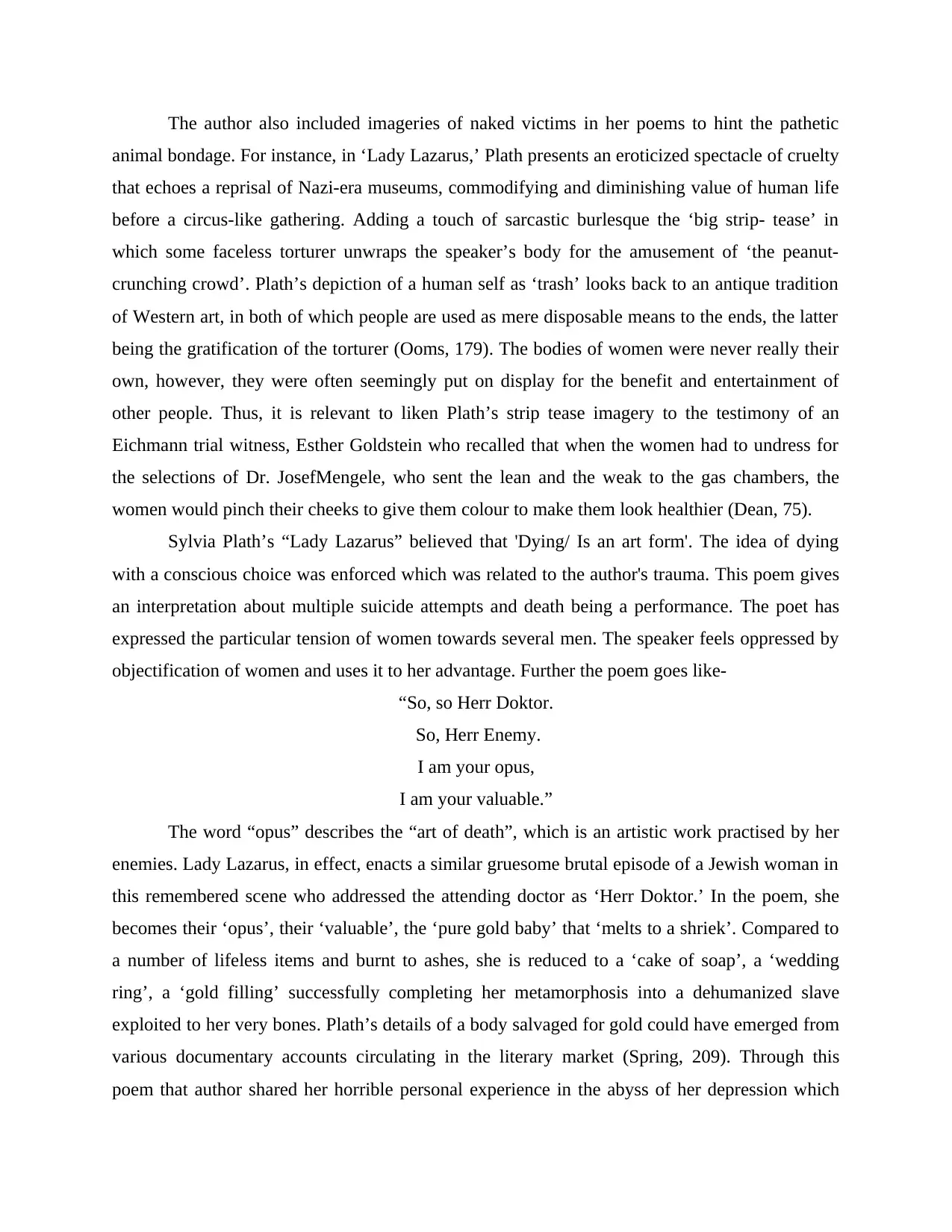
The author also included imageries of naked victims in her poems to hint the pathetic
animal bondage. For instance, in ‘Lady Lazarus,’ Plath presents an eroticized spectacle of cruelty
that echoes a reprisal of Nazi-era museums, commodifying and diminishing value of human life
before a circus-like gathering. Adding a touch of sarcastic burlesque the ‘big strip- tease’ in
which some faceless torturer unwraps the speaker’s body for the amusement of ‘the peanut-
crunching crowd’. Plath’s depiction of a human self as ‘trash’ looks back to an antique tradition
of Western art, in both of which people are used as mere disposable means to the ends, the latter
being the gratification of the torturer (Ooms, 179). The bodies of women were never really their
own, however, they were often seemingly put on display for the benefit and entertainment of
other people. Thus, it is relevant to liken Plath’s strip tease imagery to the testimony of an
Eichmann trial witness, Esther Goldstein who recalled that when the women had to undress for
the selections of Dr. JosefMengele, who sent the lean and the weak to the gas chambers, the
women would pinch their cheeks to give them colour to make them look healthier (Dean, 75).
Sylvia Plath’s “Lady Lazarus” believed that 'Dying/ Is an art form'. The idea of dying
with a conscious choice was enforced which was related to the author's trauma. This poem gives
an interpretation about multiple suicide attempts and death being a performance. The poet has
expressed the particular tension of women towards several men. The speaker feels oppressed by
objectification of women and uses it to her advantage. Further the poem goes like-
“So, so Herr Doktor.
So, Herr Enemy.
I am your opus,
I am your valuable.”
The word “opus” describes the “art of death”, which is an artistic work practised by her
enemies. Lady Lazarus, in effect, enacts a similar gruesome brutal episode of a Jewish woman in
this remembered scene who addressed the attending doctor as ‘Herr Doktor.’ In the poem, she
becomes their ‘opus’, their ‘valuable’, the ‘pure gold baby’ that ‘melts to a shriek’. Compared to
a number of lifeless items and burnt to ashes, she is reduced to a ‘cake of soap’, a ‘wedding
ring’, a ‘gold filling’ successfully completing her metamorphosis into a dehumanized slave
exploited to her very bones. Plath’s details of a body salvaged for gold could have emerged from
various documentary accounts circulating in the literary market (Spring, 209). Through this
poem that author shared her horrible personal experience in the abyss of her depression which
animal bondage. For instance, in ‘Lady Lazarus,’ Plath presents an eroticized spectacle of cruelty
that echoes a reprisal of Nazi-era museums, commodifying and diminishing value of human life
before a circus-like gathering. Adding a touch of sarcastic burlesque the ‘big strip- tease’ in
which some faceless torturer unwraps the speaker’s body for the amusement of ‘the peanut-
crunching crowd’. Plath’s depiction of a human self as ‘trash’ looks back to an antique tradition
of Western art, in both of which people are used as mere disposable means to the ends, the latter
being the gratification of the torturer (Ooms, 179). The bodies of women were never really their
own, however, they were often seemingly put on display for the benefit and entertainment of
other people. Thus, it is relevant to liken Plath’s strip tease imagery to the testimony of an
Eichmann trial witness, Esther Goldstein who recalled that when the women had to undress for
the selections of Dr. JosefMengele, who sent the lean and the weak to the gas chambers, the
women would pinch their cheeks to give them colour to make them look healthier (Dean, 75).
Sylvia Plath’s “Lady Lazarus” believed that 'Dying/ Is an art form'. The idea of dying
with a conscious choice was enforced which was related to the author's trauma. This poem gives
an interpretation about multiple suicide attempts and death being a performance. The poet has
expressed the particular tension of women towards several men. The speaker feels oppressed by
objectification of women and uses it to her advantage. Further the poem goes like-
“So, so Herr Doktor.
So, Herr Enemy.
I am your opus,
I am your valuable.”
The word “opus” describes the “art of death”, which is an artistic work practised by her
enemies. Lady Lazarus, in effect, enacts a similar gruesome brutal episode of a Jewish woman in
this remembered scene who addressed the attending doctor as ‘Herr Doktor.’ In the poem, she
becomes their ‘opus’, their ‘valuable’, the ‘pure gold baby’ that ‘melts to a shriek’. Compared to
a number of lifeless items and burnt to ashes, she is reduced to a ‘cake of soap’, a ‘wedding
ring’, a ‘gold filling’ successfully completing her metamorphosis into a dehumanized slave
exploited to her very bones. Plath’s details of a body salvaged for gold could have emerged from
various documentary accounts circulating in the literary market (Spring, 209). Through this
poem that author shared her horrible personal experience in the abyss of her depression which
⊘ This is a preview!⊘
Do you want full access?
Subscribe today to unlock all pages.

Trusted by 1+ million students worldwide
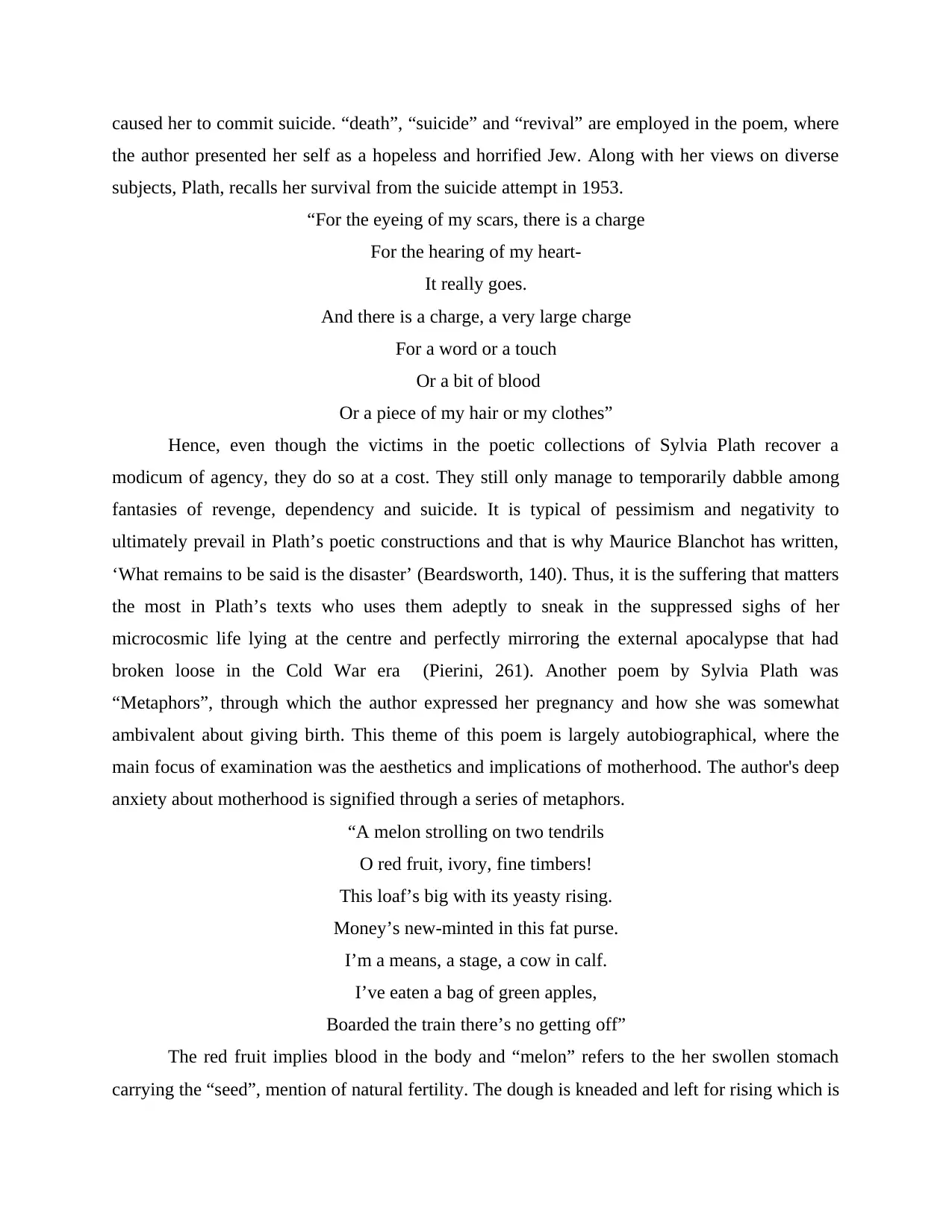
caused her to commit suicide. “death”, “suicide” and “revival” are employed in the poem, where
the author presented her self as a hopeless and horrified Jew. Along with her views on diverse
subjects, Plath, recalls her survival from the suicide attempt in 1953.
“For the eyeing of my scars, there is a charge
For the hearing of my heart-
It really goes.
And there is a charge, a very large charge
For a word or a touch
Or a bit of blood
Or a piece of my hair or my clothes”
Hence, even though the victims in the poetic collections of Sylvia Plath recover a
modicum of agency, they do so at a cost. They still only manage to temporarily dabble among
fantasies of revenge, dependency and suicide. It is typical of pessimism and negativity to
ultimately prevail in Plath’s poetic constructions and that is why Maurice Blanchot has written,
‘What remains to be said is the disaster’ (Beardsworth, 140). Thus, it is the suffering that matters
the most in Plath’s texts who uses them adeptly to sneak in the suppressed sighs of her
microcosmic life lying at the centre and perfectly mirroring the external apocalypse that had
broken loose in the Cold War era (Pierini, 261). Another poem by Sylvia Plath was
“Metaphors”, through which the author expressed her pregnancy and how she was somewhat
ambivalent about giving birth. This theme of this poem is largely autobiographical, where the
main focus of examination was the aesthetics and implications of motherhood. The author's deep
anxiety about motherhood is signified through a series of metaphors.
“A melon strolling on two tendrils
O red fruit, ivory, fine timbers!
This loaf’s big with its yeasty rising.
Money’s new-minted in this fat purse.
I’m a means, a stage, a cow in calf.
I’ve eaten a bag of green apples,
Boarded the train there’s no getting off”
The red fruit implies blood in the body and “melon” refers to the her swollen stomach
carrying the “seed”, mention of natural fertility. The dough is kneaded and left for rising which is
the author presented her self as a hopeless and horrified Jew. Along with her views on diverse
subjects, Plath, recalls her survival from the suicide attempt in 1953.
“For the eyeing of my scars, there is a charge
For the hearing of my heart-
It really goes.
And there is a charge, a very large charge
For a word or a touch
Or a bit of blood
Or a piece of my hair or my clothes”
Hence, even though the victims in the poetic collections of Sylvia Plath recover a
modicum of agency, they do so at a cost. They still only manage to temporarily dabble among
fantasies of revenge, dependency and suicide. It is typical of pessimism and negativity to
ultimately prevail in Plath’s poetic constructions and that is why Maurice Blanchot has written,
‘What remains to be said is the disaster’ (Beardsworth, 140). Thus, it is the suffering that matters
the most in Plath’s texts who uses them adeptly to sneak in the suppressed sighs of her
microcosmic life lying at the centre and perfectly mirroring the external apocalypse that had
broken loose in the Cold War era (Pierini, 261). Another poem by Sylvia Plath was
“Metaphors”, through which the author expressed her pregnancy and how she was somewhat
ambivalent about giving birth. This theme of this poem is largely autobiographical, where the
main focus of examination was the aesthetics and implications of motherhood. The author's deep
anxiety about motherhood is signified through a series of metaphors.
“A melon strolling on two tendrils
O red fruit, ivory, fine timbers!
This loaf’s big with its yeasty rising.
Money’s new-minted in this fat purse.
I’m a means, a stage, a cow in calf.
I’ve eaten a bag of green apples,
Boarded the train there’s no getting off”
The red fruit implies blood in the body and “melon” refers to the her swollen stomach
carrying the “seed”, mention of natural fertility. The dough is kneaded and left for rising which is
Paraphrase This Document
Need a fresh take? Get an instant paraphrase of this document with our AI Paraphraser
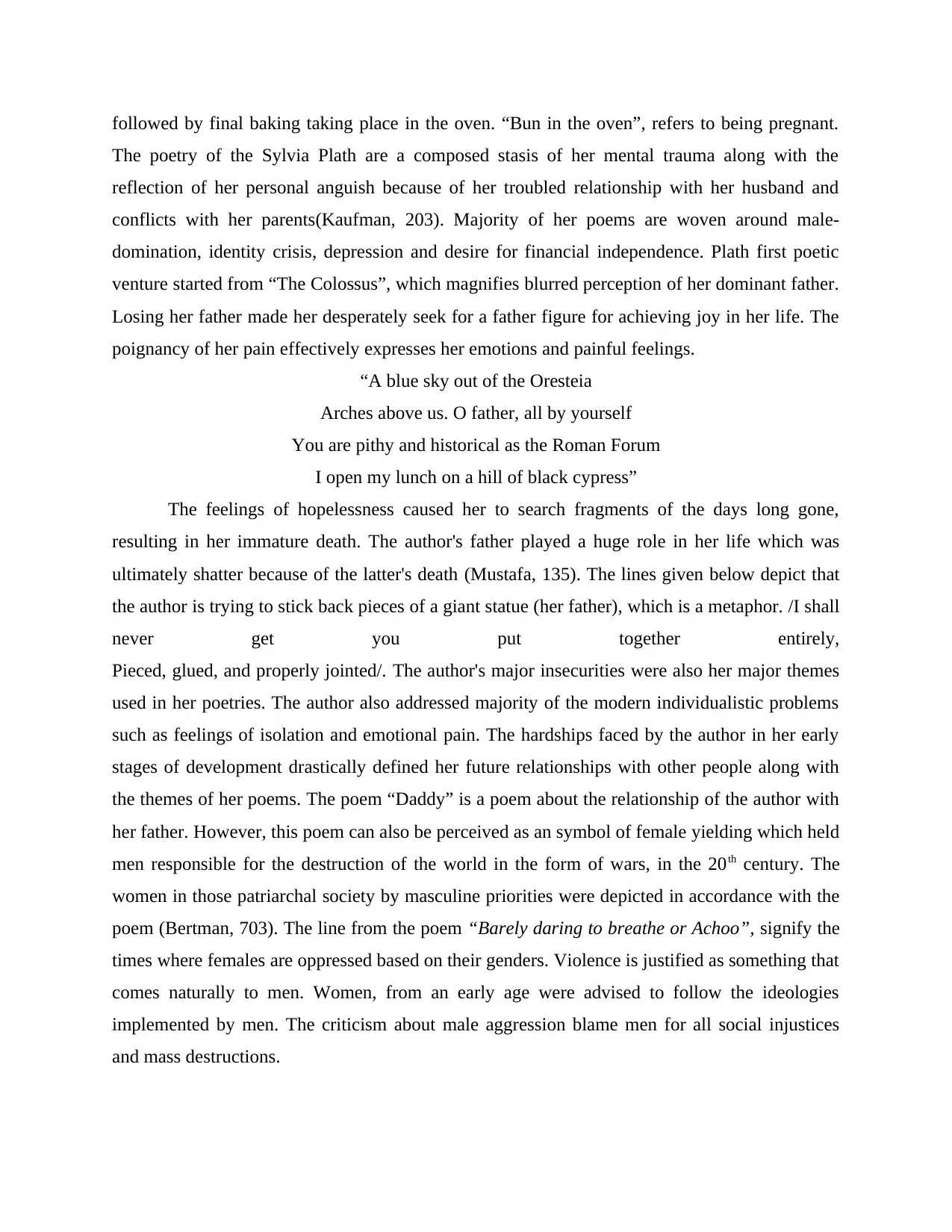
followed by final baking taking place in the oven. “Bun in the oven”, refers to being pregnant.
The poetry of the Sylvia Plath are a composed stasis of her mental trauma along with the
reflection of her personal anguish because of her troubled relationship with her husband and
conflicts with her parents(Kaufman, 203). Majority of her poems are woven around male-
domination, identity crisis, depression and desire for financial independence. Plath first poetic
venture started from “The Colossus”, which magnifies blurred perception of her dominant father.
Losing her father made her desperately seek for a father figure for achieving joy in her life. The
poignancy of her pain effectively expresses her emotions and painful feelings.
“A blue sky out of the Oresteia
Arches above us. O father, all by yourself
You are pithy and historical as the Roman Forum
I open my lunch on a hill of black cypress”
The feelings of hopelessness caused her to search fragments of the days long gone,
resulting in her immature death. The author's father played a huge role in her life which was
ultimately shatter because of the latter's death (Mustafa, 135). The lines given below depict that
the author is trying to stick back pieces of a giant statue (her father), which is a metaphor. /I shall
never get you put together entirely,
Pieced, glued, and properly jointed/. The author's major insecurities were also her major themes
used in her poetries. The author also addressed majority of the modern individualistic problems
such as feelings of isolation and emotional pain. The hardships faced by the author in her early
stages of development drastically defined her future relationships with other people along with
the themes of her poems. The poem “Daddy” is a poem about the relationship of the author with
her father. However, this poem can also be perceived as an symbol of female yielding which held
men responsible for the destruction of the world in the form of wars, in the 20th century. The
women in those patriarchal society by masculine priorities were depicted in accordance with the
poem (Bertman, 703). The line from the poem “Barely daring to breathe or Achoo”, signify the
times where females are oppressed based on their genders. Violence is justified as something that
comes naturally to men. Women, from an early age were advised to follow the ideologies
implemented by men. The criticism about male aggression blame men for all social injustices
and mass destructions.
The poetry of the Sylvia Plath are a composed stasis of her mental trauma along with the
reflection of her personal anguish because of her troubled relationship with her husband and
conflicts with her parents(Kaufman, 203). Majority of her poems are woven around male-
domination, identity crisis, depression and desire for financial independence. Plath first poetic
venture started from “The Colossus”, which magnifies blurred perception of her dominant father.
Losing her father made her desperately seek for a father figure for achieving joy in her life. The
poignancy of her pain effectively expresses her emotions and painful feelings.
“A blue sky out of the Oresteia
Arches above us. O father, all by yourself
You are pithy and historical as the Roman Forum
I open my lunch on a hill of black cypress”
The feelings of hopelessness caused her to search fragments of the days long gone,
resulting in her immature death. The author's father played a huge role in her life which was
ultimately shatter because of the latter's death (Mustafa, 135). The lines given below depict that
the author is trying to stick back pieces of a giant statue (her father), which is a metaphor. /I shall
never get you put together entirely,
Pieced, glued, and properly jointed/. The author's major insecurities were also her major themes
used in her poetries. The author also addressed majority of the modern individualistic problems
such as feelings of isolation and emotional pain. The hardships faced by the author in her early
stages of development drastically defined her future relationships with other people along with
the themes of her poems. The poem “Daddy” is a poem about the relationship of the author with
her father. However, this poem can also be perceived as an symbol of female yielding which held
men responsible for the destruction of the world in the form of wars, in the 20th century. The
women in those patriarchal society by masculine priorities were depicted in accordance with the
poem (Bertman, 703). The line from the poem “Barely daring to breathe or Achoo”, signify the
times where females are oppressed based on their genders. Violence is justified as something that
comes naturally to men. Women, from an early age were advised to follow the ideologies
implemented by men. The criticism about male aggression blame men for all social injustices
and mass destructions.
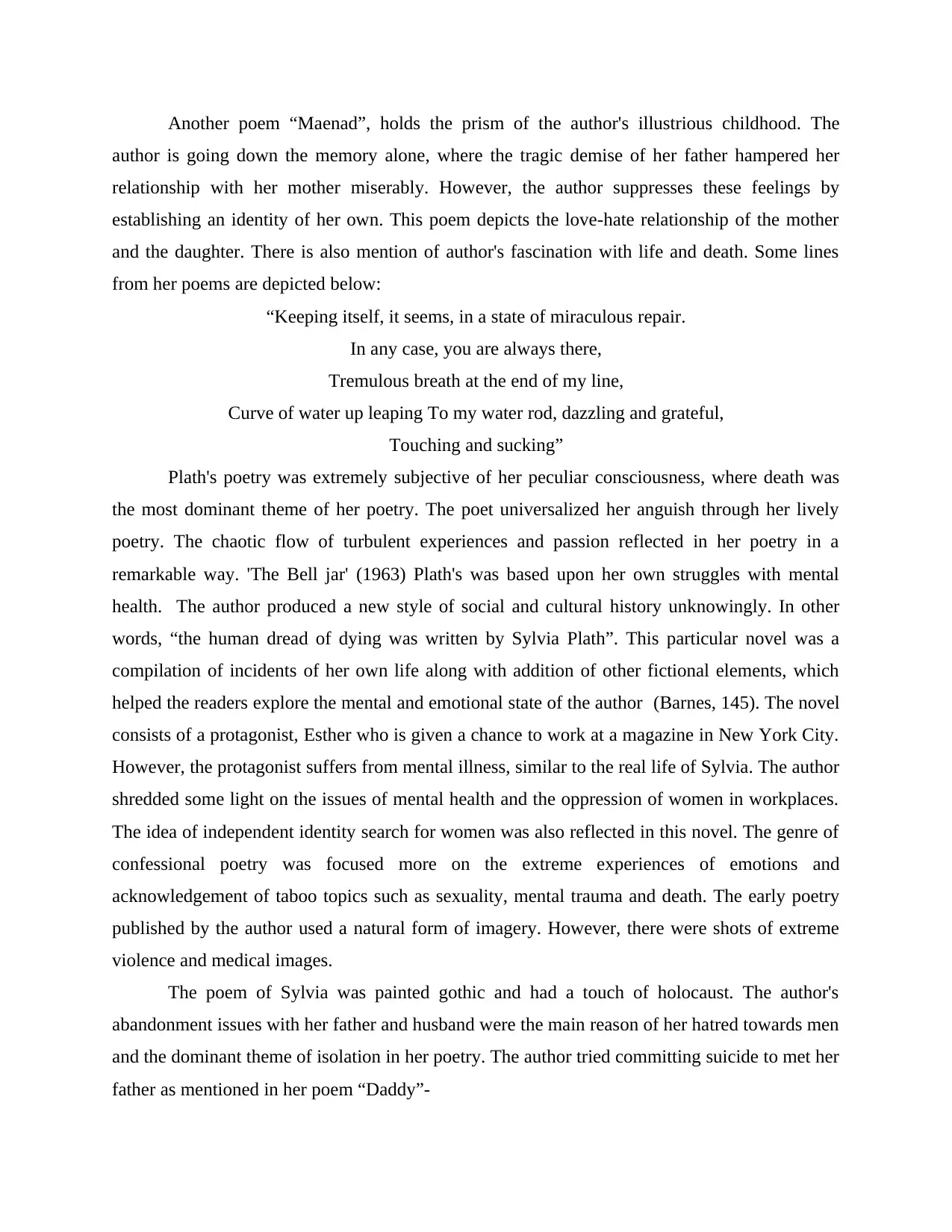
Another poem “Maenad”, holds the prism of the author's illustrious childhood. The
author is going down the memory alone, where the tragic demise of her father hampered her
relationship with her mother miserably. However, the author suppresses these feelings by
establishing an identity of her own. This poem depicts the love-hate relationship of the mother
and the daughter. There is also mention of author's fascination with life and death. Some lines
from her poems are depicted below:
“Keeping itself, it seems, in a state of miraculous repair.
In any case, you are always there,
Tremulous breath at the end of my line,
Curve of water up leaping To my water rod, dazzling and grateful,
Touching and sucking”
Plath's poetry was extremely subjective of her peculiar consciousness, where death was
the most dominant theme of her poetry. The poet universalized her anguish through her lively
poetry. The chaotic flow of turbulent experiences and passion reflected in her poetry in a
remarkable way. 'The Bell jar' (1963) Plath's was based upon her own struggles with mental
health. The author produced a new style of social and cultural history unknowingly. In other
words, “the human dread of dying was written by Sylvia Plath”. This particular novel was a
compilation of incidents of her own life along with addition of other fictional elements, which
helped the readers explore the mental and emotional state of the author (Barnes, 145). The novel
consists of a protagonist, Esther who is given a chance to work at a magazine in New York City.
However, the protagonist suffers from mental illness, similar to the real life of Sylvia. The author
shredded some light on the issues of mental health and the oppression of women in workplaces.
The idea of independent identity search for women was also reflected in this novel. The genre of
confessional poetry was focused more on the extreme experiences of emotions and
acknowledgement of taboo topics such as sexuality, mental trauma and death. The early poetry
published by the author used a natural form of imagery. However, there were shots of extreme
violence and medical images.
The poem of Sylvia was painted gothic and had a touch of holocaust. The author's
abandonment issues with her father and husband were the main reason of her hatred towards men
and the dominant theme of isolation in her poetry. The author tried committing suicide to met her
father as mentioned in her poem “Daddy”-
author is going down the memory alone, where the tragic demise of her father hampered her
relationship with her mother miserably. However, the author suppresses these feelings by
establishing an identity of her own. This poem depicts the love-hate relationship of the mother
and the daughter. There is also mention of author's fascination with life and death. Some lines
from her poems are depicted below:
“Keeping itself, it seems, in a state of miraculous repair.
In any case, you are always there,
Tremulous breath at the end of my line,
Curve of water up leaping To my water rod, dazzling and grateful,
Touching and sucking”
Plath's poetry was extremely subjective of her peculiar consciousness, where death was
the most dominant theme of her poetry. The poet universalized her anguish through her lively
poetry. The chaotic flow of turbulent experiences and passion reflected in her poetry in a
remarkable way. 'The Bell jar' (1963) Plath's was based upon her own struggles with mental
health. The author produced a new style of social and cultural history unknowingly. In other
words, “the human dread of dying was written by Sylvia Plath”. This particular novel was a
compilation of incidents of her own life along with addition of other fictional elements, which
helped the readers explore the mental and emotional state of the author (Barnes, 145). The novel
consists of a protagonist, Esther who is given a chance to work at a magazine in New York City.
However, the protagonist suffers from mental illness, similar to the real life of Sylvia. The author
shredded some light on the issues of mental health and the oppression of women in workplaces.
The idea of independent identity search for women was also reflected in this novel. The genre of
confessional poetry was focused more on the extreme experiences of emotions and
acknowledgement of taboo topics such as sexuality, mental trauma and death. The early poetry
published by the author used a natural form of imagery. However, there were shots of extreme
violence and medical images.
The poem of Sylvia was painted gothic and had a touch of holocaust. The author's
abandonment issues with her father and husband were the main reason of her hatred towards men
and the dominant theme of isolation in her poetry. The author tried committing suicide to met her
father as mentioned in her poem “Daddy”-
⊘ This is a preview!⊘
Do you want full access?
Subscribe today to unlock all pages.

Trusted by 1+ million students worldwide
1 out of 18
Your All-in-One AI-Powered Toolkit for Academic Success.
+13062052269
info@desklib.com
Available 24*7 on WhatsApp / Email
![[object Object]](/_next/static/media/star-bottom.7253800d.svg)
Unlock your academic potential
Copyright © 2020–2025 A2Z Services. All Rights Reserved. Developed and managed by ZUCOL.
